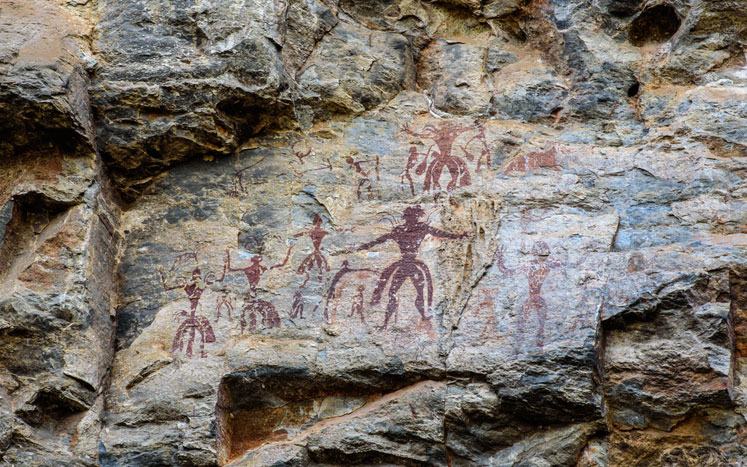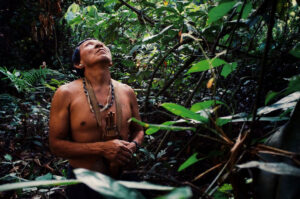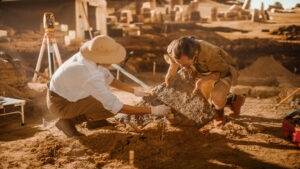

Anthropology studies the human condition through both a cultural and biological lens. Nestled somewhere in the humanities, social sciences, and natural sciences, anthropology seeks to answer the questions we have about humans – who they are, how they evolved, and the countless ways in which they differ from one another.
It’s a fascinating discipline that examines all aspects of humanity at all points in history, from its origins to the present day, which makes it a valuable and practical addition to a liberal arts degree and a springboard to any number of careers in business, health, government, education, and more.
"The purpose of anthropology is to make the world safe for human differences."
~ Ruth Benedict, American anthropologist
What Is Anthropology in the Context of a Liberal Studies Program?
 Anthropology is the science of humanity, which includes the study of the origins and evolution of humans—our customs, languages, cultures, societies, civilizations, and more—at all times. From prehistoric man to modern man, ancient civilizations to present-day societies, anthropology considers the biological, historical, linguistic, and cultural factors that influence human development and behavior.
Anthropology is the science of humanity, which includes the study of the origins and evolution of humans—our customs, languages, cultures, societies, civilizations, and more—at all times. From prehistoric man to modern man, ancient civilizations to present-day societies, anthropology considers the biological, historical, linguistic, and cultural factors that influence human development and behavior.
Anthropology is, in short, an examination of the human experience.
Thanks to the study of anthropology, we have a clearer picture of the development of humanity – who we are, where we come from, our similarities and differences, and our place in nature. Through it, we are better equipped to understand change, make connections, and solve problems associated with human behavior.
Although anthropology, at first glance, may bring to mind images of scientists combing the most remote corners of the globe for the existence of ancient civilizations and lost cultures, this liberal arts discipline is also highly relevant in contemporary society because it also examines everything from social structures to social movements to religious belief systems in today’s world. The information gleaned from anthropological studies influences government, business, marketing, forensics, healthcare, education, and much, much more.
When you hear anthropology explained as a study of humanity “at all times,” it’s true. Whether it’s ancient societies or contemporary culture, anthropology leaves no stone unturned when it comes to better understanding the how’s and why’s of humankind. It’s little wonder why anthropology has often been described as the quintessential liberal arts discipline.
What is the Difference Between Anthropology and Sociology?
Anthropology and sociology, at first glance, appear to be one in the same. And there are similarities between the two – namely that they’re both social sciences that study the causes and effects of human action.
But while sociology is focused on humankind in society, anthropology is focused on the culture of humans. Anthropology studies humans and how they interact within their environment on a sociocultural, linguistic, biological, and/or archaeological level, while sociology studies social interactions and the social causes and consequences of human behavior.
Sociology studies humans according to social structures and social relationships, while anthropology is focused on a broader, holistic study of humans around the world, both in the past and present.
Breaking Down the Study of Anthropology: A Closer Look at the Subfields
 What are the four fields of anthropology? Because of the wide breadth of anthropology, it’s often divided into four, subdisciplines: archaeology, biological anthropology, sociocultural anthropology, and linguistic anthropology:
What are the four fields of anthropology? Because of the wide breadth of anthropology, it’s often divided into four, subdisciplines: archaeology, biological anthropology, sociocultural anthropology, and linguistic anthropology:
- Sociocultural Anthropology: Focused on the social and political aspects of humans. Sociocultural anthropologists often study particular cultures and the process of cultural change and social transformation. Race, class, and gender inequality, culture and ideology, and family systems are just a few of the topics explored in sociocultural anthropology.
- Archaeology: Focused on investigating and documenting the remains of human activities and cultural systems.
- Biological Anthropology: Focused on the relationship between genes, behavior, and the environment to learn more about human culture, society, and behavior. Biological anthropologists seek to better understand human evolution and the roots of human behavior
- Linguistic Anthropology: Focused solely on communication as part of human society
The adaptability of anthropology has kept the field just as relevant today as it was generations ago and has resulted in modern examinations of everything from the environment to feminism. Just some of the contemporary areas of study within the field of anthropology include:
- Biological Anthropology
- Business Anthropology
- Diffusion Anthropology
- Ecological Anthropology
- Environmental Anthropology
- Evolutionary Anthropology
- Feminist Anthropology
- Forensic Anthropology
- Functional Anthropology
- Holism Anthropology
- Interpretive Anthropology
- Medical Anthropology
- Physical Anthropology
- Public Anthropology
- Social Anthropology
- Structural Anthropology
- Theological Anthropology
- Urban Anthropology
Anthropology As It Is Presented in a Liberal Arts Undergraduate or Master’s Program
A liberal arts education isn’t really complete without an examination of anthropology. Whether chosen as the focus of a liberal arts degree or studied within the context of another discipline, anthropology has become the ideal addition to any course of study in the liberal arts at the undergraduate or graduate level.
Students seeking to understand change, compare and contrast information, make connections, and solve problems often study anthropology within the context of a liberal arts degree, and for good reason. Long viewed as an interconnected discipline, anthropology and its subfields study and scrutinize the nuances and complexities of humanity. The information gleaned through its study has the ability to bridge divides, interconnect, and make sense out the what’s arguably the world’s most fascinating subject: humankind.
While a study of anthropology may lead to a lifelong career of research and study, the benefits of anthropology as part of a liberal arts degree extend far beyond academia. Today’s liberal arts majors who study anthropology are policymakers, advisors, decision makers, managers, and evaluators, and many careers are built upon a liberal arts education that’s rich in anthropological study.
Anthropology has also become the ideal foundational area of study for pre-Law, pre-Med and future MBA students, and is often studied alongside degrees in education, engineering, nursing, and more.
"Anthropology demands the open-mindedness with which one must look and listen, record in astonishment and wonder that which one would not have been able to guess."
~ Margaret Mead, American cultural anthropologist
Anthropology as Part of a BLS Degree
Anthropology within the context of a liberal arts bachelor’s degree provides a broad, humanistic overview of the discipline, which opens up plenty of professional doors for careers in business, social work, government, and more. A Bachelor of Liberal Studies (BLS) with study in anthropology also provides outstanding preparation for graduate study in the social sciences (medical school, public health, etc.), law, business, cultural resource management, public service, and anthropology.
Anthropology as Part of an MLS Degree
The study of anthropology within a Master of Liberal Studies (MLS) degree allows students to study anthropology in both theory and method. Choose anthropology courses within your liberal arts master’s degree and you’ll enjoy a comprehensive overview of the discipline while you sharpen your critical thinking skills and communication skills and examine anthropology in terms of historical analysis, cultural interpretation, cultural materialism, and more.
Exploring Jobs for Graduates of Liberal Arts Degrees with an Anthropology Focus
A liberal arts degree with an anthropology focus is a fantastic starting point to careers in nearly every sector and industry:
Government
Jobs in planning, research, historic and environmental preservation, management, and more are available at the federal, state, and local levels:
- Natural Resource Management
- Culture Resource Management
- Crime Scene Investigation
- International Development
- Forensic Anthropology
- Public Administration
Education
Many undergraduate liberal arts majors who study anthropology go on to earn graduate degrees and assume positions in education at the primary, secondary, and post-secondary levels. Some of the areas of study within education include:
- Cultural Studies
- Ecology
- Cognitive Psychology
- Linguistics
- English as a Second Language (ESL)
- Public Health
Business
A foundation in anthropology as part of a liberal arts bachelor’s degree provides unique insight into the business and corporate world that is simply unmatched and serves as a solid framework to future MBA study. Some of the career options include:
- Lobbyist
- Human Resources
- Clinical Research Coordination
- Intercultural Communication
- Market Research
Health
A bachelor’s degree in the liberal arts with an anthropology focus provides a holistic foundation for future graduate study and careers in health occupations such as:
- Nursing
- Public Health
- Epidemiology
- Medicine
- Veterinary Medicine
- Dentistry
- Physical Therapy
- Occupational Therapy
Public service
Liberal arts degrees that include anthropology study are a near-perfect match to careers and graduate study in public and community service. Liberal arts graduates champion social causes and serve as competent managers, research, and organizers.
Just some of the career choices in public service include:
- Advocacy
- Community Organization and Planning
- Social Work
- Political Activism
- Museum Curation




